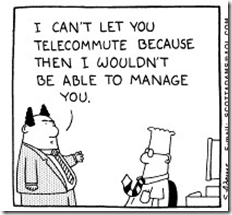 TreeHugger isn’t always full of tech but it’s a great site none the less, they posted a reader survey asking about telecommuting and attached this Dilbert sketch.
TreeHugger isn’t always full of tech but it’s a great site none the less, they posted a reader survey asking about telecommuting and attached this Dilbert sketch.
Never has Dilbert rung more true.
Currently the first option "my company won’t let me" is leading by a massive margin.
I’m not surprised.
Having worked in corporate, wanna be corporate, should have been corporate and should not have been corporate IT, I can attest to the fact that many areas of work can now be taken care of from your home office with the need to travel to ‘work’ rarely.
Essentially you’d save you and your company time and money.
However, the way things stand at many offices right now, the people to make the telecommuting decisions (i.e yes you can or no you can’t) are those people who feel their jobs would be in jeopardy because they would not be able to ‘manage’ their telecommuting employees.
They’re afraid that their cushy, ‘managerial’ position would be at risk if there is no-one in the office.
Change your thinking people!
Are you afraid employees won’t work as much from home?
It has been proven that home based employees often work more than they do while in the office and put in longer hours.
Here’s an idea, if they don’t do their job – let ’em go!
VOIP and broadband are now at the level that you can have an office phone and computer out of the office, complete with extension, voicemail, forwarding and everything. In fact, the only thing that might give away the fact that you can hear the TV in the background.
Administrators and managers should be considering remote workers period as a form of contingency planning. What if your office burned down or suddenly became inaccessible? What if you couldn’t get to your lobby doors for days, weeks or even months? Wouldn’t multiple ‘branch’ (or home office) locations make sense?
Are you ready to deploy this plan in an instant? Maybe it would be a good idea to see if certain employees are even able to telecommute.
Anyway, forget your managing. you’d have more to manage and I’m sure you could find work if you’re worth it.
Think about your employees (go on, try it for a second).
think about contingency (I know, it’ll never happen to you, right?)

